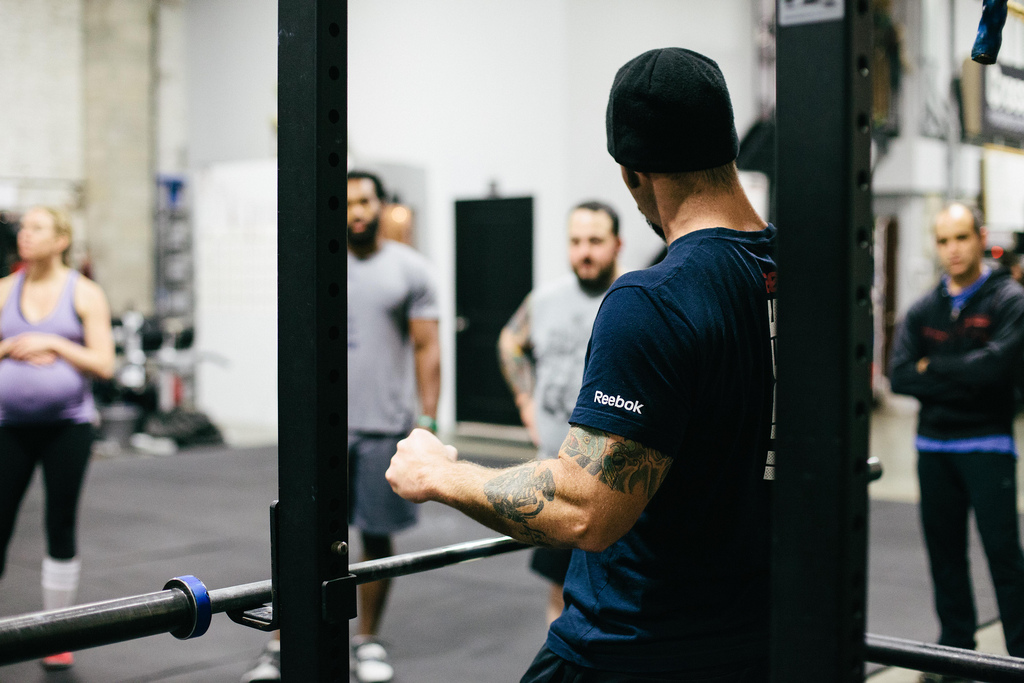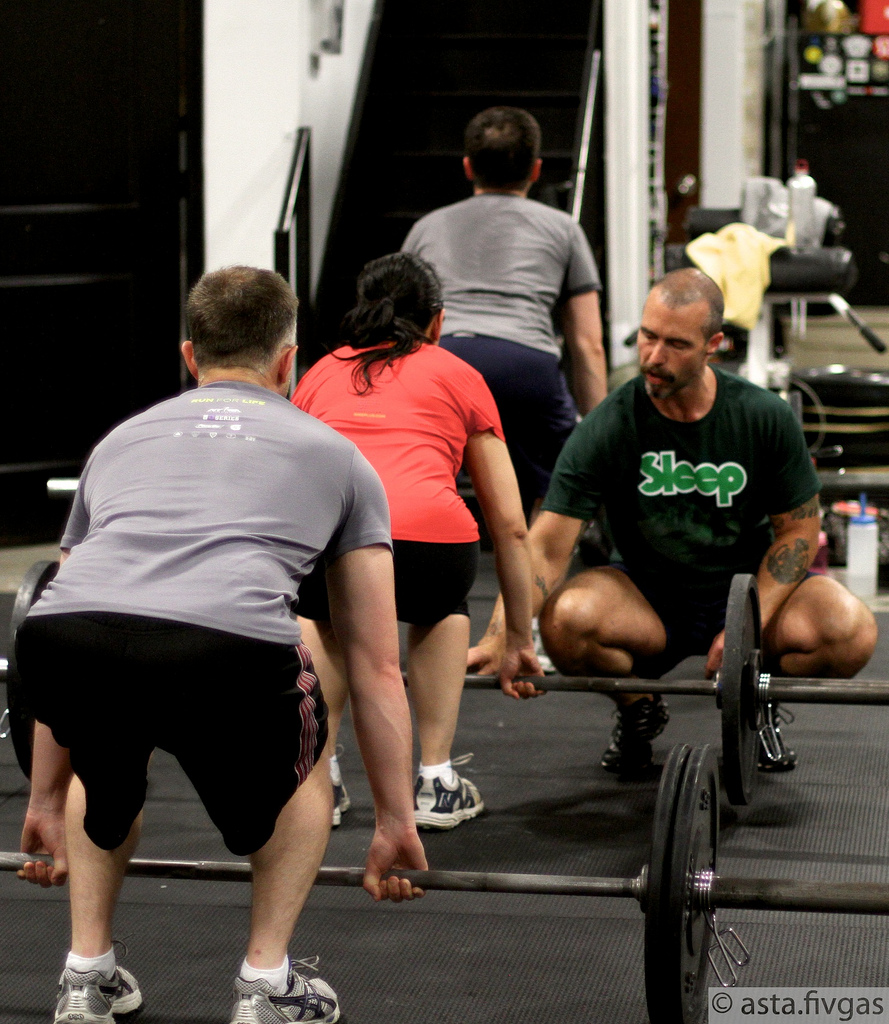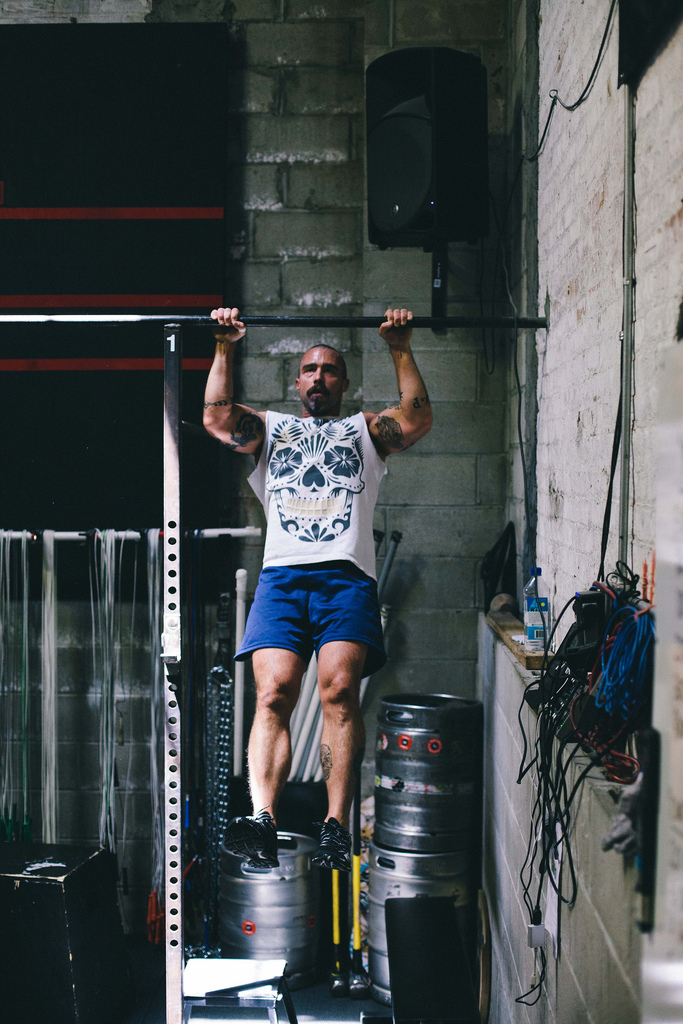Don't Be a Cheerleader: 10 Pieces of Advice for CrossFit Coaches
 Monday, April 14, 2014 at 12:00AM
Monday, April 14, 2014 at 12:00AM 
When Christian Fox joined Urban Total Fitness in the Bronx for $50 a year in 2002, he was 29 and it was his first time in a gym. He had never been an athlete and despite dabbling in yoga, he was pushing 200 pounds of not-healthy weight. He chain-smoked and would gorge on the farmer’s breakfast at a local diner after partying most weeknights—a typical lifestyle of those in the restaurant business. Now, in the presence of floor-to-ceiling mirrors and big, ripped dudes who were hoisting hundreds of pounds of weight off their chests, he wanted something else. He wanted to be strong. 95 pounds on a barbell seemed like all the weight in the world at that point, but his journey toward CrossFit had begun.
12-plus years later, unless it’s on a dumbbell, 95 pounds is no longer heavy. Fox has been coaching at CrossFit South Brooklyn since 2009, where his wife also became a coach in 2011. He writes the programming for CFSBK’s eight-week macrocycles and is the gym’s resident nutrition expert. Business Weekly recently did a series of interviews with him and in the videos, you can see he’s covered in tattoos (the words “somewhat damaged” are inked largely in a serif font across his left thigh). He has well-trimmed facial hair, loves Metallica and anything Trent Reznor touches, and rides a 2003 Honda Shadow Spirit 750 as often as he can through the streets of Brooklyn and on the open roads of upstate New York. He’s what people who have never been to New York think when they hear “Brooklyn.” But his toughness and hard body belie the emotional core he had to tame into a productive, meaningful life—one that centers around helping others become the best, strongest version of themselves.
He’ll still tell you that his initial experience at that unremarkable gym in the Bronx shifted it all for him. He was astounded by how much his body could change and what he could achieve in such a short period of time. Soon after the experience, he went back to school for exercise science to become a personal trainer and was reading everything he could get his hands on about fitness. He soon began training clients at a New York Sports Club in Brooklyn. The first year was rough as he pulled in minimum wage and regularly contemplated quitting and returning to the world of restaurants, where he was comfortable and accomplished as a natural foods chef. But he kept at it and began picking up steady clients, eventually developing a steady business.
In late 2006 while reading Testosterone Nation, amidst the photos of bronzed, swollen muscles he came across an article Mark Rippetoe wrote about this thing called CrossFit. Rippetoe touted it as the best training program out there, offering maximum results with minimal fanfare. Fox’s niche as a trainer involved a lot of corrective exercises, many of which he now considers hokey, like having someone stand on a Bosu ball with one leg—stuff he says wasn’t even close to being considered functional fitness. CrossFit seemed different. He bought a copy of Starting Strength and reached out to the owner of the only affiliate in Brooklyn at the time—David Osorio. His gym’s members trained in a stark concrete loft-like space called The Brooklyn Lyceum, which boasted high, church-like windows and no heat or air-conditioning.
Even before he began training at CFSBK, Fox got his Level 1 certification at a gym in New Jersey and started implementing the methodology with his clients at NYSC. His clients began seeing dramatic improvements but NYSC wasn’t pleased that Fox was responsible for bailing barbells and a bunch of sprinting around their small space. He had been tiring of the “globo-gym” atmosphere for a while. He didn’t like feeling part of an apparatus that seemed to string clients along for years without getting results. 
Along with the community he and his wife found at CFSBK, he fell more and more in love with the measurability of CrossFit’s methodology. He soon also discovered The Zone diet and along with his background in nutrition, it felt as though he’d found a secret formula that didn’t require magic, only hard work and commitment. In one of Fox’s favorite novels, Zen and the Art of Motorcycle Maintenance, Robert Pirsig writes, “You look at where you’re going and where you are and it never makes sense, but then you look back at where you’ve been and a pattern seems to emerge.” How true that now feels, though there is no need to romanticize his journey with CrossFit—it’s also simply the most effective use of his and his clients’ time.
Coach Fox sat down with Inside the Affiliate right before doing 14.3 (which he finished with 130 reps, now at the age of 42). While mobilizing on a lacrosse ball and 6’’ orb, he shared some essential wisdom he’s learned over the years about how to succeed in the business of coaching CrossFit.
10 Pieces of Advice For CrossFit Coaches
1. Be committed to becoming an excellent coach, especially when it’s tough. Even if you start part-time, apply yourself as if you’re going to do this as a career and give it a fair shot. Two months is not a fair shot, six months is not a fair shot. You need to give it a year and say, I’m going to try and be as good as I can be at this. Fox suggests learning as much as possible especially beyond the Level 1 Certification. Take a college course somewhere, do some of the more rigorous certifications out there, read a lot—and then apply it, start practicing.
2. Be honest with people. Some people might just want to look better naked or chase their kid around without being out of breath, Fox says. But other people come in thinking they’re going to be the next Rich Froning or Annie Thorisdottir. Part of your job as a coach is to temper peoples’ expectations. “I think a lot of new coaches want to be a cheerleader and tell people that they’re doing well. That’s a big part of CrossFit—that we want everyone to do well. But I think as a coach, your responsibility is a little different. You should still encourage but you can’t just tell somebody, Go, go, go! Pick it up! Do another rep! Sometimes they’re not in the right position to do that.” Fox insists: a client’s technique has to come first, then you can move into the intensity.
3. Find that sweet spot of confidence. “If you have 30 people in one class, you have to be super confident and if you’re not, you have to fake it, so people know they need to pay attention,” he says. But command respect because your voice is worth listening to, not because you’re being a jerk.
4. Cultivate your people skills. You can know a lot, Fox says, but if you don’t know how to deal with people, you won’t be able to deliver. When you see somebody moving poorly, pull that person back and gauge how coachable they are. Some people love being told to stop because they know they’re not moving well and want to get better. But other people will say, “Why are you telling me to stop? I’m fine.” You’ll have to approach people in different ways, and sometimes figure out how to give people what they need packaged in what they want. 
5. Be willing to be bored to make your clients better. Sometimes coaching people can be boring in the beginning—though certainly not any easier. New athletes need to learn to squat, deadlift, and press. Nothing very sexy, Fox says. But these simpler movements are fundamental to CrossFit. Get comfortable with them as a coach, and be exceptional at teaching them.
6. Remember the importance of sleep and nutrition. CrossFit doesn’t happen in a vacuum, and getting results requires adequate sleep and nutrition. Learn as much as you can and talk to your athletes about recovering and eating healthy, clean foods that complement their training. But Fox says to remember that you’re not initially going to change someone’s food dogma, so again, figure out how to work with where they’re at. Give someone enough to change that they can actually do it and see a positive adaptation. Then maybe they start sleeping better or their workouts kick a little more ass—that’s when you hook them.
7. Get a mentor. When Fox trains new coaches, he asks them: “So, how do you think so-and-so is moving? What’s going on over there?” He always tries to put it back on the coach, since his experience has shown that people often know the answer (he does this with clients, too). Finding someone who can facilitate this and be a sounding board is important.
8. After running a class, ask yourself a few questions. CFSBK’s ethos is structured around being professional, effective, and inclusive. After each class, we’re asking, Was it professional? Did the things that were supposed to happen, happen? Did it happen on time? Did I get to communicate with everyone? We’re asking, Was it effective and inclusive? Did everyone get what they needed out of it? Was it appropriate for the skill levels present? And also: Was it fun? Because that’s CrossFit too, Fox insists. If people to going to spend this much time with you, it should be fun.
9. Let go. If you’re lucky, you’re getting someone for five hours a week. But seven days times 24 hours makes five not that much. Just adding CrossFit to someone’s life is not going to change that life—the change needs to be more holistic and some people aren’t willing to go there. “I had to realize I couldn’t save everybody,” Fox says. “When people keep asking the same question, it gets frustrating. They’re waiting for me to say, It’s easy, do this. And that’s just not true. I think people have to be willing to accept hard answers.” And when they’re not ready yet, you have to let it go.
10. Be humble and learn from your mistakes. In Zen and the Art of Motorcycle Maintenance, Pirsig says, “The real cycle you’re working on is a cycle called yourself.” The same is true with CrossFit—as a coach and as an athlete. Keep working on yourself, and commit to being part of the force that makes this business better.

Reader Comments (6)
What a great post! Having worked with Fox, it's obvious that he has dedicated himself to the art of coaching. I've always appreciated his honesty -- both when I do something well and when I can do something better. I think these are great tips for anyone with clients. I'm a lawyer, and I think these are great reminders for my client relationships as well. Thanks!
One of many things I love about Fox is that he tells it like it is. (see point #2) He points out flaws in your technique in a respectful way, and when you get a compliment out of him, you know you've earned it. I still remember when I hit 170 on the deadlift for the first time and he responded on the blog with "how you have grown!" Big grin that day. :)
This is excellent, man. Really excellent.
Great article! Point #2 "Be Honest with People" resonated with me. I always felt that he tells it like it is, especially when I am not doing something right, or better yet, if I can do something better. So, when he gives a "good job!", you know you've earned it. He should also know that he "yell it like it is", instead of "telling like it is" ... Tough Love is under-utilized in this delicate-feelings world today. It is appreciated though, since it is done compassionately.
Cool article. Fox is the man.
Great article! It helps a lot to those that are just starting coaching and also to those that have been a few years doing it.
Thanks!